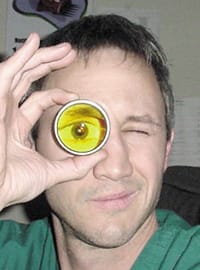street
smarts
Making the Grade
In Optometry
GPA isn't the only predictor of a
successful career. You can't learn these important skills from a textbook.
BY DAN BECK, O.D., Leland, N.C.
You see them on campus every day. They sit in the front rows for lectures. Their test results are always at the top of the list. They stride purposefully into the library while you idle outside, waiting for friends to go for coffee. Yes, they're the optometry school geeks, and they're wreaking havoc on your GPA.
Take heart. Even though exemplary grades are critical for postgraduate scholastic success, they alone won't guarantee your success as a practitioner. You'll also need some important skills that you can't learn from a textbook. Master these, and you'll develop into a good optometrist.

By the time you can write O.D. after your name you will have passed your practical exams and demonstrated that you can use the tools of our trade. We all can operate a slit lamp, use a phoroptor and perform gonioscopy. But knowing how to use these instruments and truly mastering them are two vastly different concepts, as the latter involves good manual dexterity and technique.
Keep your manual skills sharp. Once you start working, it's easy to forget good technique on the lesser-used instruments. You may find it hard to believe, but some older O.D.s have never become proficient with the binocular indirect ophthalmoscope. And even after 11 years of practice, I still haven't truly mastered gonioscopy or scleral depression. The single best way to master these skills is to do them. The old saying "use it or lose it" is absolutely dead on.
PATIENT INTERACTION
A 4.0 GPA means absolutely nothing to a patient sitting in your chair. Graduating at the top of your class won't help you if you have the personality of a paper bag.
Over the years, I've found that great people skills have nothing to do with class rank. And Paul Ajamian, O.D., reports that several studies have shown the best way to not get sued is to make sure your patients "like" you. You may be a brilliant clinician, but if you don't smile, make eye contact and generally connect with your patients, you won't have much of a practice.
WELL-ROUNDED
I've met many optometry students and recent graduates over the last 11 years. I've also met just as many college students trying desperately to get into optometry school. While all were intelligent and appeared capable of succeeding, those who seemed destined to succeed possessed important qualities that weren't found in any textbook.
I received some great insight from one of my professors during my first year of optometry school. When he saw how distraught many of us were after one of his exams, he offered this piece of wisdom: Question: What do they call the optometry student who graduates last in his class? Answer: Doctor.
Keep up your grades, but remember to develop those skills you can't learn from a textbook. You'll be a better doctor regardless of your class standing.




